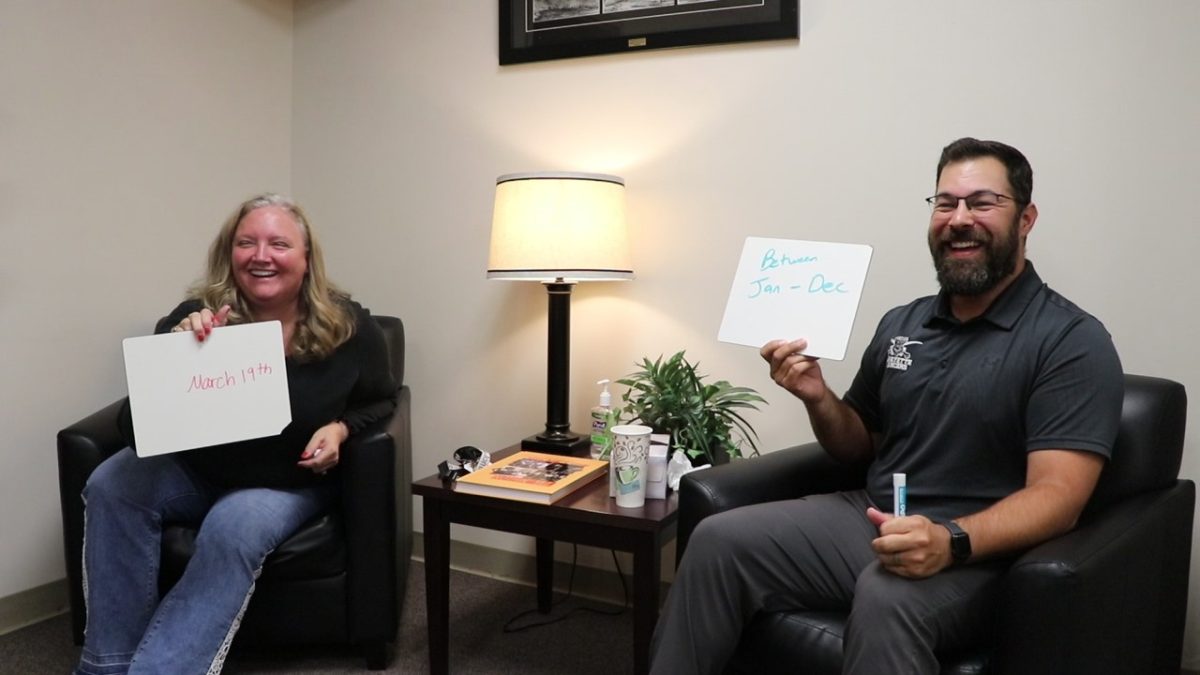Students work at necessary businesses despite stay at home order
On March 18, a woman loads up her car after shopping at Walmart. As a precaution, she wore gloves and a mask in order to delay the transmission of COVID-19.
A typical after school job for Lafayette students is working at a local grocery store. However, with the international COVID-19 pandemic, their job has become anything but typical.
These teenagers are now considered essential workers, giving them front row seats to humanity’s reaction to the pandemic. As panic has erupted the past few weeks, student have noted how grocery stores have become the sight of something out of a movie.
“People were buying cart loads of food. One customer had a cart just filled with toilet paper. I was astounded,” junior Sean Manno said. “It was something that we never really saw except for the day before Thanksgiving or Christmas.”
Empty shelves and full carts are the new normal at stores everywhere.
“Everyone was just panic buying literally everything, and it was super weird to see all of the empty shelves,” senior Max Schoening said. “It wasn’t just the essentials and stuff that were getting bought up, we were completely out of all like 20 types of syrup.”
In response to the influx of shoppers, many grocery store employees have seen a dramatic increase in hours expected for them to work.
“I usually work 10-15 hours per week, but when everything started ramping up they had me working way more, up to 45 hours per week when I last worked,” Schoening said.
The stores themselves have also changed hours to adapt to the needs of shoppers.
“Dierbergs opens two hours later and closes one hour earlier so we can have more time to stock the shelves,” senior Megan Scholl said.
Stores have started to put limits and restrictions on customers as well. In an effort to curb the amount of people within the store, Dierbergs and Schnucks have limited shoppers to one person per household in addition to restricting the amount of customers allowed inside at one time. Stores have also placed limits on the purchase of cleaning, sanitizing, and paper products as well as many others. However, many employees have observed that some customers aren’t adhering to the rules.
“The biggest surprise is that a lot of the customers aren’t following the guidelines,” Scholl said. “People are not staying six feet away from each other when they wait in line. We have a hand washing station set up outside our store, but people are not washing their hands before they come in.”
The reluctance of many customers to follow the guidelines of the grocery stores as well as the Centers for Disease Control and Prevention (CDC) has made working an even bigger risk for employees.
“Customers are leaving their used face masks and gloves throughout the store instead of throwing them away,” Scholl said.
As a result of concern for their own health and that of their families Manno, Scholl and Schoening have stepped back from their jobs for the time being.
“I worked for about two weeks during the quarantine, then I was pressured by my parents to go on a leave of absence,” Manno said. “My grandmother lives with us and they were afraid that I would contract the disease and get her sick.”
However, senior Natalie Karlsson has decided to take advantage of the high demand for groceries. Once the St. Louis stay at home order was announced, Karlsson quit her job at St. Louis Bread Company and started working for Shipt.
“About two weeks [after quitting] I introduced the idea of working for a delivery company [to my parents] to earn money before college and to get a new car,” Karlsson said.
Shipt allows Karlsson to earn money buying and delivering groceries to those staying at home to avoid high risk places.
Through her new job Karlsson has also observed changes in the environment of stores. “Everyone’s wearing masks and gloves, security guards stand around and people are afraid to be near you,” Karlsson said. “It makes dropping off groceries easier because people are extremely appreciative, and I just drop them off at doors instead of helping bring them inside.”
While Karlsson does not directly work in a grocery store, she is exposing herself to stores, making safety measures a necessity in order to protect herself and those she is delivering groceries to.
“I take a lot of precautions, like wearing a mask and gloves, using Lysol and Clorox wipes. It’s all for safety,” Karlsson said.
Your donation will allow our student journalists to continue their work. You may become a PATRON by making a donation at one of these levels: White/$30, Black/$50, Gold/$100. Patron names will be published on the website and once per quarter on our social media accounts.









































